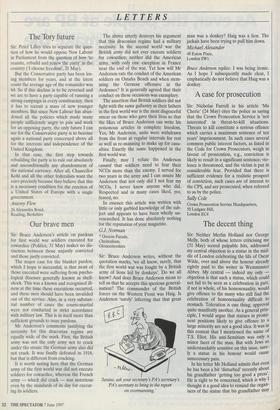Our brave men
Sir: Bruce Anderson's article on pardons for first world war soldiers executed for cowardice (Politics, 31 May) makes no dis- tinction between those unjustly convicted and those justly convicted.
The major case for the blanket pardon, which I hope is successful, is that most of those executed were suffering from psycho- logical illnesses generally known as shell- shock. This was a known and recognised ill- ness at the time these executions occurred, and these men should have been invalided out of the service. Also, in a very substan- tial number of cases the courts-martial were not conducted in strict accordance with military law. This is in itself more than sufficient grounds to issue pardons.
Mr Anderson's comments justifying the necessity for this draconian regime are equally wide of the mark. First, the British army was not the only army not to crack under the strain; the German army also did not crack. It was finally defeated in 1918, but that is different from cracking.
It is worth noting here that the German army of the first world war did not execute soldiers for cowardice, whereas the French army — which did crack — was notorious even by the standards of its day for execut- ing its soldiers. The above utterly destroys his argument that this draconian regime had a military necessity. In the second world war the British army did not ever execute soldiers for cowardice; neither did the American army, with only one exception in France near the end of the war. Yet how will Mr Anderson rate the conduct of the American soldiers on Omaha Beach and when stem- ming the German offensive in the Ardennes? It is generally agreed that their conduct on these occasions was exemplary.
The assertion that British soldiers did not fight with the same gallantry as their fathers in the first world war is the most disgraceful smear on those who gave their lives so that the likes of Bruce Anderson can write his poisonous articles in complete freedom. Yes, Mr Anderson, units were withdrawn from the front at regular intervals for rest as well as re-manning to make up for casu- alties. Exactly the same happened in the first world war.
Finally, may I refute the Anderson canard that soldiers need to fear their NCOs more than the enemy. I served for two years in the army and I can assure Mr Anderson that not only did I not fear my NC0s, I never knew anyone who did. Respected and in many cases liked, yes; feared, no.
In essence this article was written with little or only garbled knowledge of the sub- ject and appears to have been wholly un- researched. It has done absolutely nothing for the reputation of your magazine.
G.J. Norman
7 Queens Parade, Cheltenham, Gloucestershire










































































 Previous page
Previous page